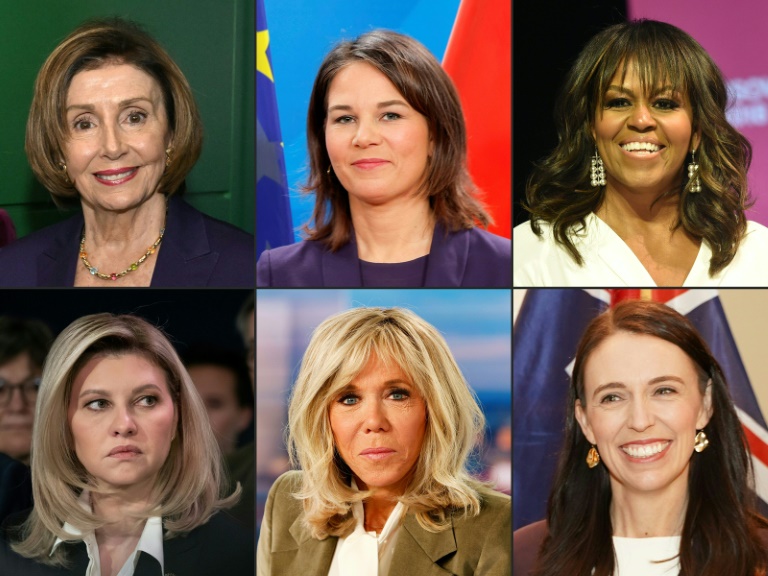Fake photos showing Ukraine’s first lady sunbathing topless, incorrect video subtitles defaming Pakistani feminists for “blasphemy”, slow-motion clips falsely depicting “drunk” female politicians — a barrage of disinformation targets women in the public eye.
Researchers say “gendered disinformation” –- when sexism and misogyny intersect with online falsehoods — has relentlessly targeted women around the world, tarnishing their reputations, undermining their credibility and, in many cases, upending their careers.
AFP’s global fact-checkers have debunked falsehoods targeting politically active women, or those linked to prominent politicians, exposing online campaigns that feature fake information or manipulated images that are often sexually charged.
Last year, a fake image of Ukraine’s First Lady Olena Zelenska lying topless on a beach in Israel was shared widely on Facebook, triggering criticism that she was having fun while her war-torn country was suffering.
A reverse image search by AFP showed the woman in the photo was, in fact, a Russian television presenter.
Former American first lady Michelle Obama and current French first lady Brigitte Macron have also been targeted in false online posts that claimed they were born as men. The disinformation sparked an avalanche of mockery and transphobic remarks.
New Zealand’s Jacinda Ardern, who announced her resignation as prime minister in January, is another prominent figure that faced a torrent of disinformation about her sex.
“Women –- especially those in positions of power and visibility –- are unduly targeted by online disinformation,” Maria Giovanna Sessa, a senior researcher at the nonprofit EU DisinfoLab, wrote in a report last year.
– ‘Chilling effect’ –
In another tactic that raised alarm in 2020, a slowed-down version of a video of Nancy Pelosi, the then US House Speaker, went viral. The effect made her speech slurred and gave the false impression that she was drunk.
“Building on sexist stereotypes and disseminated with malign intent, gendered disinformation campaigns have a chilling effect on the women they target,” Lucina Di Meco, a gender equality expert wrote in a study published last month.
The disinformation often leads to “political violence, hate and the deterring of young women from considering a political career,” said the study titled “monetizing misogyny.”
In disinformation tactics typically deployed by political opponents, female politicians are sometimes framed as inherently undependable, too emotional or promiscuous to hold office.
When Germany’s current foreign minister, Annalena Baerbock, was running for chancellor in 2021, she was the subject of frequent disinformation campaigns which raised questions about whether she was fit for the job.
One of them featured images of a nude model purporting to be of her, alongside suggestions that she had engaged in sex work.
Gendered disinformation represents a national security threat as it can be exploited by autocratic states such as Russia to exercise foreign influence, according to multiple researchers.
It can also be used to subdue the opposition.
“When autocratic leaders are in power, gendered disinformation is often used by state-aligned actors to undermine women opposition leaders, as well as women’s rights,” Di Meco’s report warned.
– ‘Attacks on dignity’ –
Women around the globe battle falsehoods that reinforce stereotypes that they are unintelligent or inefficient.
In 2021, Egyptian sports shooter Al-Zahraa Shaaban faced false social media posts that she had been excluded from the Tokyo Olympics because she had shot the referee.
That sparked a wave of comments that ridiculed women and questioned their ability to pursue such sporting activities.
Similar questions were raised about their ability to take on military jobs following last year’s crash of an F-35 fighter jet on the deck of a US aircraft carrier in the South China Sea.
False social media posts held the world’s first woman to fly an F-35 responsible for the crash. The pilot, in fact, was a man.
Such humiliating falsehoods, researchers say, can have a silencing effect on women, who are drawn to disengage, censor themselves and even avoid male-dominated professions, including politics.
That was a concern raised in a letter by dozens of US and international lawmakers in 2020 to Facebook, which along with other platforms has been blamed for the algorithmic amplification of false and hateful content targeting women.
In a statement to US media at the time, Facebook acknowledged that online abuse of women was a “serious problem” and pledged to work with policymakers on their concerns.
“Make no mistake, these tactics, which are used on your platform for malicious intent, are meant to silence women, and ultimately undermine our democracies,” the letter said.
“It is no wonder women frequently cite the threat of rapid, widespread, public attacks on personal dignity as a factor deterring them from entering politics.”
burs-ac/tjj

 Business4 months ago
Business4 months ago
 Business5 months ago
Business5 months ago
 Events3 months ago
Events3 months ago
 People4 months ago
People4 months ago
 Events6 months ago
Events6 months ago
















